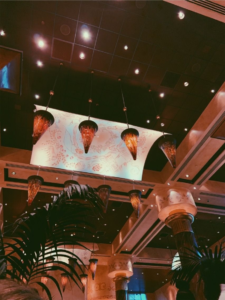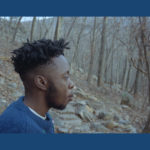REALNESS

The friction in my psyche melts away. I try to pick up what remains of my fragmented beliefs. It’s harder to remember who I am.
I sit on the stoop of my Bed-Stuy apartment with my friend David, his hair drawn into a blonde ponytail. He holds his mask away from his face as he speaks. He is leaving the city that night for Pennsylvania. This is a week ago. I talk to him about free love for two hours. “It seems like you’re awakening,” he says. The ego as a collection of beliefs, past experiences––the surface starts to shake.
I’m afraid to ride my bike to Prospect Park today. Authenticity is a performance. I sit in a field in Vermont, looking on. I am in college and the flowers are in bloom, the goldenrods. I write a pastoral poem about them for my intermediate poetry workshop, about them dying, in which they are no longer in bloom. In the future, no one I love will understand the kind of love I feel. My desireless, incommunicable love.
I reach, in no particular direction, to get bound up with them in a chaotic entanglement. Life has no direction, I discover––its purpose is self-evident. Or otherwise, I must accomplish in order to be “real.” The spell of realness the economy entertains, my friends entertain, my family.
My panic attack at The Cheesecake Factory is no one’s business.
I have a panic attack about the clattering of silverware and the low lighting; I want to communicate. I am sixteen. I desire to communicate, as I desire it now: how whatever I might’ve said wouldn’t make sense, the need to make sense won’t make sense; how its “postmodern design hellscape” seduces me in the dimness of its family restaurant lighting. With my mother and grandfather and grandmother. The need.
It’s a need for sustained openness–––to live open, to live without internal contraction. The whole meal I am heartbroken.
I can’t account for how long any given speech act will last. How long? If communication is just being? This is proof enough: the ability to be for any extended period of time if I don’t think, “Who to sustain the performance for?” Do you ever really know whose eyes are watching? By the end of the play, I am nowhere to be found. I have evacuated my body. I die all the time.
If you’re wondering, reader, how long will this last, the answer is forever honey. I can tell there’s fear arising in our bodies; this attachment to some vestige of the familiar, to a desire we think we own. Patience is the wrong wrong to commit here. Authenticity isn’t coming with time; we’re leaving with time. If what we want is to be “real,” we’re not going to get what we wanted and it will turn out to be the best thing in the entire world.

Anaïs Duplan is a trans* poet, curator, and artist. He is the author of a forthcoming book of essays, Blackspace: On the Poetics of an Afrofuture (Black Ocean, 2020), a full-length poetry collection, Take This Stallion (Brooklyn Arts Press, 2016), and a chapbook, Mount Carmel and the Blood of Parnassus (Monster House Press, 2017). In 2016, he founded the Center for Afrofuturist Studies, an artist residency program for artists of color, based at Iowa City’s artist-run organization Public Space One. Find more information at www.worksofanais.com or on Instagram at @an.duplan.

 BACK TO ISSUE
BACK TO ISSUE